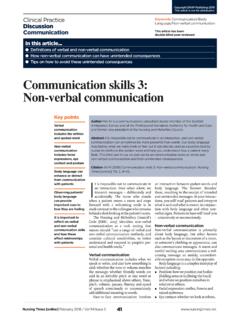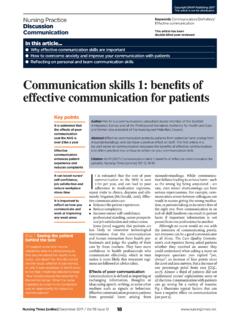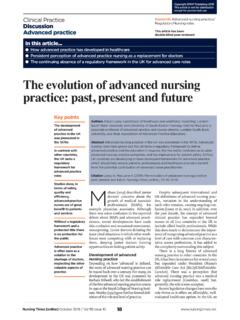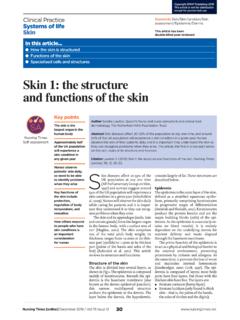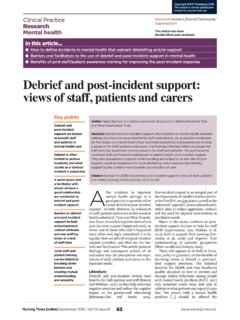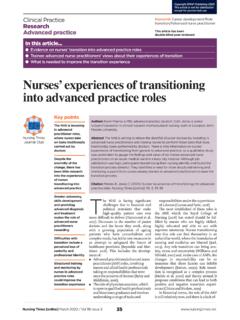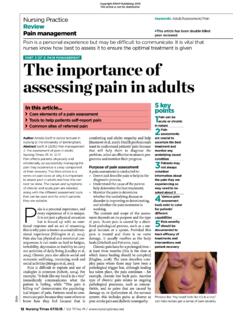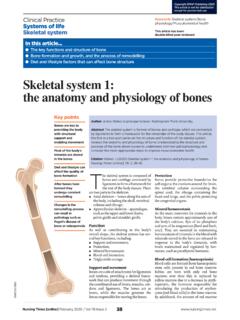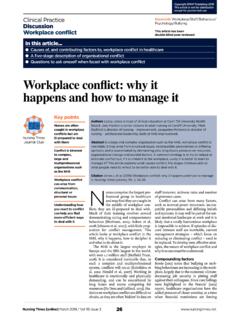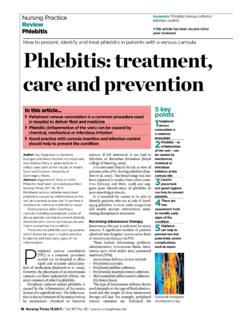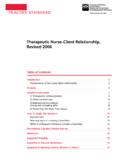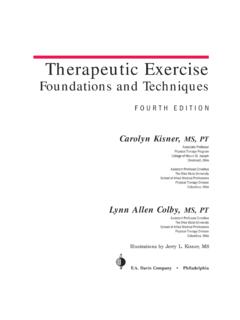Transcription of Communication 5: Effective listening and observation skills
1 Copyright EMAP Publishing 2018 This article is not for distribution60 Nursing Times [online] April 2018 / Vol 114 Issue 4 is a vital component of Effective Communication . Not being listened to can be infuri-ating, demoralising and dam-aging; conversely, being heard can have a positive impact and patients can derive therapeutic value from being listened to and understood. Effective listening involves the eyes as well as the ears, as body language must be observed. Lis-tening cannot be a passive activity: it takes effort and genuine engagement. Words need to be heard, considered and listeningToo often, external distractions (noise, other people) and internal diversions (thoughts or worries), take us away from the here and now.
2 Mindfulness learning to shut these out will help you focus on patients and actively listen to them. Gil-bert (2009) says mindfulness is about learning to pay attention in a particular kind of way and recognising how your brain can go off on all kinds of tangents because of your thinking and fantasies. In mindfulness, we learn to hold attention in the present moment without judgement .Mindful listening can:l Improve retention (so you remember more of what is said);l Increase attention span (so you stay alert for longer);l Improve understanding (which enhances rapport);l Reduce error (which improves accuracy and boosts patient safety).It is important to consciously hear what someone is saying, pay special attention throughout the encounter, observe body language, and silence inner thoughts.
3 Barriers to listeningThere are many barriers to listening . For example, students may need to concentrate on an unfamiliar procedure and as a result, only half-listen to their patient. Experi-enced nurses can find themselves on auto-pilot , where they have performed some-thing so many times that they do not think or observe reactions. Even while under-taking routine tasks for patients, they need to remain alert and listen to patients responses and observe their reactions. It is important to reflect on the expres-sion to give one s undivided attention , and minimise or eradicate distractions that result in only a portion of your attention being dedicated to your patient. For example, if the computer in the consulting room pings when an email arrives you may be distracted by wondering who is making ALAMYK eywords Communication skills / listening /Observing/Questioning This article has been double-blind peer reviewedKey points listening is a vital component of Effective communicationPatients can derive therapeutic value from being listened to listening is not a passive activityMindfulness can help nurses to focus on patients and improve their active listening skills Communication 5.
4 Effective listening and observation skillsAuthor Moi Ali is a communications consultant, board member of the Scottish Ambulance Service and of the Professional Standards Authority for Health and Care, and former vice-president of the Nursing and Midwifery CouncilAbstract The fifth article in our six-part series on Communication skills explores how nurses can improve their listening and information-gathering skills . It looks at how patients recall of information can be improved, enhancing Effective Communication . Citation Ali M (2018) Communication skills 5: Effective listening and observation . Nursing Times [online]; 114: 4, this Why listening and information-gathering skills are importantl The value of mindful listeningl Reflecting on your listening skillsClinical PracticeDiscussionCommunication Copyright EMAP Publishing 2018 This article is not for distribution61 Nursing Times [online] April 2018 / Vol 114 Issue 4 " Why do you think you feel like that?
5 L Can you tell me about any other symptoms? l " What happened? l What effect is it having on you? If you have a hunch as to what is wrong, it can be a temptation to start by asking closed or leading questions to confirm the diagnosis:l " Are you having trouble sleeping? l " Have you been feeling nauseous? l Would you say you feel depressed? l You re not constipated, are you? More open alternatives include:l Tell me how you are sleeping l " What symptoms have you had? l How is your mood, or how are you feeling within yourself ? l Tell me about your bowel Neutral open questions do not suggest a correct answer and allow a more discursive conversation. Clinical decisions will be based to a large extent on information gath-ered during the patient interview, so a con-sultation comprising a conversational style will encourage the patient to open up and to share more information.
6 In turn, this will help to make a more accurate diagnosis. ConclusionCommunication should involve both par-ties, although not always in equal measure. In some circumstances it is appropriate for one person to talk more than the other. If you have information to impart, you may do most of the talking; in other situations, such as during counselling, or when seeking information, the patient will speak most. There is no prescribed talking: listening ratio. Remain sensitive to the other party and alert to the appropriate balance for the l Moi Ali is author of How to Communicate Effectively in Health and Social Care: A practical guide for the caring professions, published by Pavilion ReferencesGilbert P (2009) The Compassionate Mind. London: Constable and can be frustrating when patients are slow or hesitant in their answers, unclear, confused or contradictory whether as a result of nervousness, their condition, or their natural disposition.
7 Resist the tempta-tion to finish a sentence or make their point for them: you do not know what they are planning to say. Avoid jumping in with con-clusions or solutions before you have heard their account, as interruptions may give the impression that you do not have time to listen, or that you do not value their contri-bution. This will inhibit what or how much they share with you; if you need clarification, wait for a natural pause before seeking fur-ther on your Communication style. If someone has difficulty expressing them-self, might they also be struggling to under-stand you? Do you need to slow down, use a different vocabulary, or ask for (or provide) information in smaller chunks?Asking questionsNurses often use a structured, systematic approach to taking a clinical history. How-ever, there is a risk that in attempting to focus on what is wrong by using closed or funnelled questions, the richness of infor-mation that comes from open-ended enquiry is lost.
8 Open questions allow for more free-flowing dialogue and can pro-duce improved clinical data, leading to dif-ferential diagnoses and better patient out-comes. A conversational style can also coax patients into disclosing more information, which in turn can help with diagnosis. Typical open questions might include:l " What is the problem? l How are you feeling? contact, and the connection between you and your patient will suffer. Sometimes, something about a patient such as appear-ance, accent or mannerisms can become a distraction: do not allow these things to affect you and learn to block them barrier to Effective listening is the patient s ability to subconsciously filter out messages that make them feel uncom-fortable. As a professional, you cannot do this; you can avoid it by becoming con-scious of situations where you are prone to block messages, and choosing to actively listen instead.
9 Be aware of the possibility that your patient may also be blocking out the difficult message you are delivering. Checking and clarifyingWhat someone says, and what we hear, may not be the same. We reinterpret using our own knowledge, experience, preju-dices and beliefs, and these affect how we react to what is said; in turn this affects what we hear and what we do not hear. Misunderstanding may arise from an incorrect interpretation of what was said, or from being given an unclear or incom-plete account that leaves gaps in our understanding. To avoid this problem, summarise, recap, paraphrase or ask ques-tions to check that you have correctly heard and understood. This gives the patient an opportunity to correct any mis-understanding. Useful phrases include:l Can I just check that I ve understood this correctly?
10 You have said ;l " Let me check that I m clear about your symptoms. You tell me ;l " I want to be sure I understand what you ;l What you seem to be saying ;l " Could you tell me more Show that you are listening attentively. Incline your head, nod and make occa-sional affirmative sounds, like mm or uh huh to acknowledge that you are listening . Nurses may worry that saying yes , nod-ding, and encouraging patients may make them believe you agree with what they are saying; however, listening and encour-aging are not the same as agreeing. For more articles on patient experience, go to PracticeDiscussionBox 1. ReflectionThink of an occasion when you told someone something important, but felt that you were not listened to. What made you think you were not being heard? How did it make you feel?
